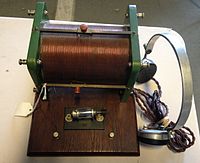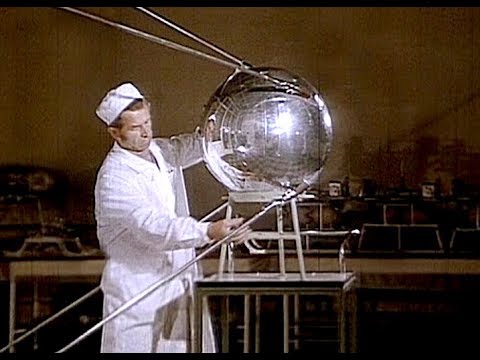

The beeping started out quiet and high-pitched like the squeak of a violin strike, then grew louder and louder until Tommy had to reduce the gain on his radio or risk breaking the speakers in his tiny headphones. After the beeping peaked, the pitch would dropped like a slooping trombone, as the beeps faded into scratchy silence. Tommy had never heard anything like it.
***
He wanted a chemistry set for his birthday, but his mother gave him the short wave radio kit instead saying, “this one won’t blow up the house.” The kit was far more do it yourself that the box implied. It included no tools, the lengths of wire were too short, and the tin headphones required mittens to keep the sharp metal edges from cutting into Tommy’s ears. It took a few months, but with the help of his science teacher Mr. Ronson, and a kindly clerk at the hardware store, he was able to get it working.
Had Tommy’s mother chosen the chemistry set, things would have turned out differently. Once he depleted the chemicals, Tommy would have moved outdoors into the fresh air and sunshine and might have made a few friends. As it was, he disappeared into the whistles and hums of his radio, caressing the dials to persuade signals bouncing off the ionosphere into his room, staying up long after his mother had gone to bed. Broadcasts and conversations from the other side of the world found their way to his radio, keeping Tommy company. His mother worked two jobs, and if she could pick up an extra shift didn’t come home until well after dark. When she finally got some sleep, she was out like a stone.
Tommy was one of the original latch-key kids, arriving home alone after school and enjoying a bowl of cornflakes for dinner. After his father left, Tommy and his mother moved to a smaller house on the edge of town. Tommy was in a different school and had little luck making friends, leaving him free to pursue his hobby. He sometimes told Mr. Ronson or the hardware store clerk when he heard something especially good.
Then came the beeping. Beeping as such wasn’t totally foreign to him. Tommy had heard what Mr. Ronson told him were proximity pulses from ships at sea, airports sending out location beacons, and Morse code, but this beeping was different. It was moving and doing so at a terrific speed. Once the traveling beeps started, most of the usual radio chatter stopped so operators could tune in as the mystery came into range. Every ninety-eight minutes it returned and was so regular that Tommy was having trouble sleeping lest he miss its passing.
For days, there was no information about the beeping. The radio operators figured out from the speed and regularity of the signal it had to be something orbiting the earth. Upon this discovery, the previous quiet turned to constant chatter. Some thought it was aliens; a theory quickly disputed as all agreed aliens would approach silently and observe. Others thought it was a weapon developed by the Air Force to distract radio operators from communicating with one another. The more conservative operators thought it was merely a device to map the earth’s surface using radar.
After a week of wondering, news broke that a Russian satellite was zooming around the planet at eighteen-hundred miles per hour. The United States was still in a Red Scare, with McCarthyism just barely put to sleep and plenty of citizens certain Soviet oppression could be around any corner. “Better Dead than Red” banners hung in the school gymnasium along with Halloween Dance decorations, as it too was just around the corner.
Tommy wasn’t so sure the Russians meant any harm. The beeping was alarming at first, especially the ear-splitting power of the signal, but once he knew more about it, he found it comforting. A reliable friend you could count on, like Old Faithful or the Fourth of July. He decided to make contact with the satellite, to let its operators know he was listening. He checked out a book from the library and learned all he had to do was reverse the wires in his radio receiver, add a microphone and increase the strength of the signal. As it was, his radio ran off a brick-sized six-volt lantern battery. He needed much more power. Asking round-about questions of Mr. Ronson and the hardware clerk he learned the mouthpiece in a telephone could be his microphone, and he could switch out the battery and simply plug the transmitter into a wall receptacle. He took apart the phone in the kitchen and cut the cord from a lamp in the living room. He had to track down more tools and have Mr. Ronson vouch for him so he could borrow a soldering gun from shop class.
I had been three weeks since the satellite appeared. It continued to signal as it passed over, just as friendly and regular as ever. Tommy had most of his transmitter assembled but couldn’t decide what message to send. Should he just say hello? Should he send a message in Morse code? He chose to play one of his father’s records. There was a stack of them in the basement next to a portable record player. Tommy’s mother told him not to play them so naturally, he listened to them all many times. He chose his favorite, hauled the record player up to his room and put it next to the microphone. Pulling the vinyl disc out of its paper, he put the needle on and waited until the satellite was due to return. It was night, and at the appointed time, he dropped the needle, and plugged his transmitter into the wall as the sound of The Ink Spots “If I Didn’t Care” rushed out from Tommy’s bedroom. He watched as the label turned round and round, the arm of the player wavering a bit from the off-center pressing, as he swayed a little to the music. A warm sensation filled his chest. Tommy felt glad he could say hello to his Russian friends with music.
Tommy ignored the rubbery smell at first, not wanting to interrupt his maiden broadcast. But as the wire plugged into the wall grew hotter Tommy started to look around for a source, but saw nothing. Right were the wire met the wall plug the rubber insulating it ignited like a firecracker. The transmitter continued, hungrily sucking power from the wall until the wire itself melted and the signal stopped. The song played on as Tommy stamped out the burning line in the rug where the melted copper dripped. He quickly reassembled his receiver to see if the Russians would acknowledge his hello. At the time the satellite should be passing overhead, Tommy heard nothing but background noise. He listened intently for the next ninety-eight minutes, but when the time came for beeping, he heard only silence. Radio operators around the world confirmed with each other the signals had stopped. Tommy scared the Russians into silence and they left him behind without a word.
In the weeks that followed, the world was told the batteries in the satellite had finally run dry so it could no longer send a signal. But Tommy knew the truth, and could never again listen to “If I Didn’t Care” without crying.